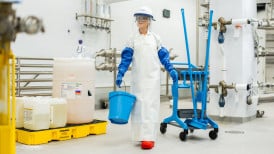Industry Insights

- June 23, 2011
A couple points of interest from a recent article, "Of Cheese, Seals and Deming" in Cheese Reporter by Dan Strongin reminded me of my previous experience. I was buyer for a hospital as well as my past accounting experience with a large dairy processing company.
In one section Mr. Strongin refers to the least expensive ingredient may look like it’s saving you money but you may lose in yield. We had to watch this closely at the hospital as well, buying the lesser expensive item doesn’t do you much good if the doctors won’t use it or it doesn’t supply the patient with the results expected. As we state in our new website, we have over 750 suppliers that we buy from. Thus, we can supply you with a reduction in cost as you are only dealing with one vendor – us. We do not promise to be the lowest supplier on all items but combining
- July 01, 2010
Irregardless of our personal opinions this is certainly an issue of spirited debate, having many implications involving food safety, free market concerns, product availability
- May 21, 2010
Many food processing companies store pH electrodes as spares for those that are currently in service. This program works well to ensure testing can continue in the event
- May 03, 2010
- March 25, 2010
Imagine a food processing plant without water. Sure there are some that are going as dry as possible to avoid microbiological problems, but for most water plays multiple roles in the manufacturing process. Well or city water for potable and non potable streams, make-up water for reconstituting ingredients, cooling water for heat exchangers, condensate (cow) water for soft rinse applications, water carrying permeate from UF units, water for cleaning chemicals and equipment rinses, effluent water to carry waste to treatment plants, laboratory water purified for various tests, potable water for personnel use. You get the picture – water is everywhere in a production operation.
Depending on use, however, each of these “waters” must have certain qualities.
- Is potable water chlorinated?
- Is the coliform count acceptable?
- Does it have heavy metals like copper or iron?
- Is the hardness softened for cleaning detergents?
- Is permeate clear indicating good UF performance?
- What is the conductivity of laboratory water or cow water?
- Are cleaning solutions sufficiently concentrated, acid, alkaline, or do sanitizing rinses have sufficient strength?
- What is the total solids, BOD, or COD of effluent?
These are just some of the variables which must be monitored when using water effectively in a processing plant.






